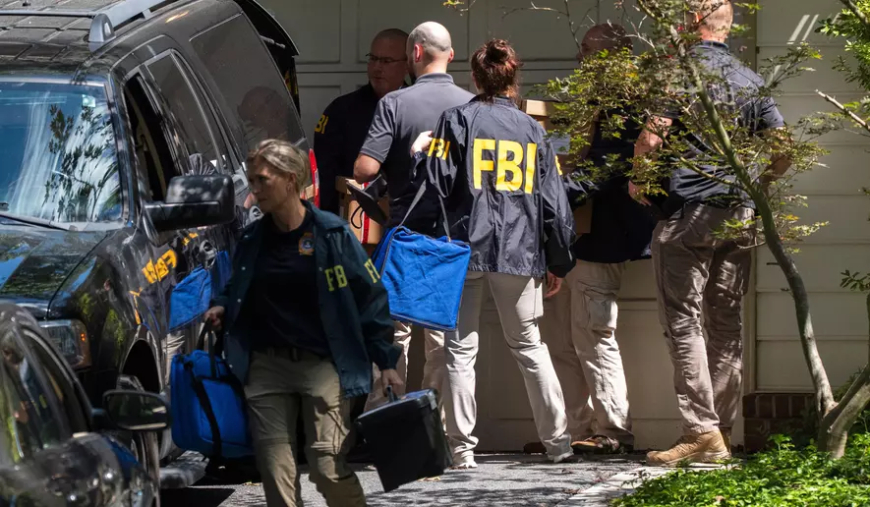Bolton FBI Raid: Retaliation or Legitimate Probe? Insider Accounts Raise Alarming Questions
On August 22, 2025, FBI agents raided John Bolton’s home. Was it a legitimate probe or political retaliation for his Trump criticism? DOJ insiders and historical precedents raise critical questions.

On Friday, August 22, 2025, former National Security Adviser John Bolton found himself at the center of a political and legal firestorm after FBI agents executed a raid at his Washington, D.C. residence. The Department of Justice has remained tight-lipped, citing an “ongoing investigation,” but anonymous officials familiar with the probe suggest the case may involve classified documents, financial disclosures, or foreign lobbying inquiries.
The move has reignited debates about whether the raid is part of a legitimate investigation or a retaliatory measure tied to Bolton’s longstanding criticisms of President Donald Trump.
Inside the DOJ’s Calculations
Two DOJ officials, speaking anonymously, told NewsSutra that the raid followed “months of deliberation” within the National Security Division. One insider argued that the warrant was supported by evidence reviewed by a federal magistrate judge, making it “legally solid.” Another, however, admitted there was “concern about optics,” given Bolton’s visibility as a Trump critic.
Historically, former officials have rarely faced raids of this magnitude. The DOJ’s actions are now being compared to past high-profile searches, such as the 2022 FBI raid on former President Trump’s Mar-a-Lago estate. According to the Justice Department’s guidelines, extraordinary approval thresholds must be cleared before raiding political figures or former government officials.
Bolton’s History of Criticism
Bolton, who served briefly as Trump’s National Security Adviser in 2018–2019, has consistently attacked Trump’s foreign policy approach. In his 2020 memoir The Room Where It Happened, Bolton accused Trump of prioritizing personal political interests over national security.
Trump, for his part, has not hidden his disdain for Bolton, once calling him a “wacko” and “disgruntled employee.” Against this backdrop, the FBI’s raid has fueled speculation that political payback may have played a role.
A former DOJ prosecutor, now teaching law at Georgetown, explained:
“When you apply such aggressive tactics against someone like Bolton, the legal bar is extremely high. The danger is that any perception of retaliation undermines the DOJ’s independence.”
Social Media and Public Sentiment
Within hours of the raid, #BoltonRaid was trending on X (formerly Twitter). Social media analysis from CrowdTangle shows that posts framing the raid as “political revenge” outnumbered those supporting it as a “national security measure” by nearly 2-to-1.
Right-leaning media outlets amplified concerns of retaliation, while progressive commentators largely defended the FBI’s action as overdue scrutiny of an elite insider. This polarization underscores how law enforcement moves against high-profile figures quickly morph into partisan narratives.
Small But Significant Precedents
While unprecedented in recent decades, legal scholars point to a handful of cases where former officials faced aggressive federal action. For example:
-
In 1973, former Vice President Spiro Agnew resigned after a DOJ probe uncovered tax evasion and bribery.
-
In 1984, Reagan administration officials faced federal investigations tied to covert foreign policy actions.
These precedents suggest that while rare, federal raids on former officials are not without legal foundation. The open question is whether the DOJ can demonstrate the Bolton case fits this framework.
What Comes Next?
As of Monday, August 25, 2025, Bolton’s legal team has not issued a full statement beyond calling the raid “unwarranted and politically motivated.” Congressional Republicans have already pledged to hold hearings, demanding Attorney General Merrick Garland explain the DOJ’s decision.
Meanwhile, policy experts caution that the raid could further erode public confidence in law enforcement institutions. If proven legitimate, the DOJ may strengthen its image of impartiality. If revealed as retaliatory, it risks one of the most serious credibility crises in its history.
For now, Americans are left to speculate — and wait for answers.











